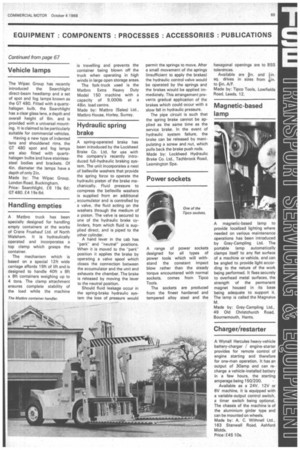Hydraulic spring brake
Page 71

If you've noticed an error in this article please click here to report it so we can fix it.
A spring-operated brake has been introduced by the Lockheed Brake Co. Ltd, for use with the company's recently introduced full-hydraulic braking system. The unit incorporates a nest of belleville washers that provide the spring force to operate the hydraulic piston of the brake mechanically. Fluid pressure to compress the belleville washers is supplied from an additional accumulator and is controlled by a valve, the fluid acting on the washers through the medium of a piston. The valve is secured to one of the hydraulic brake cylinders, from which fluid is supplied direct, and is piped to the other cylinder.
A hand lever in the cab has "park" and "neutral" positions. When it is moved to the "park" position it applies the brake by operating a valve spool which closes the connection between the accumulator and the unit and exhausts the chamber. The brake is released by moving the lever to the neutral position.
Should fluid leakage occur in the spring-brake hydraulic system the loss of pressure would permit the springs to move. After a small movement of the springs (insufficient to apply the brakes) the hydraulic control valve would be operated by the springs and the brakes would be applied immediately. This arrangement prevents gradual application of the brakes which could occur with a slow fall in hydraulic pressure.
The pipe circuit is such that the spring brake cannot be applied as the same time as the service brake. In the event of hydraulic system failure, the brake can be released by manipulating a screw and nut, which pulls back the brake push rods. Made by: Lockheed Hydraulic Brake Co. Ltd., Tachbrook Road, Leamington Spa.












































































































